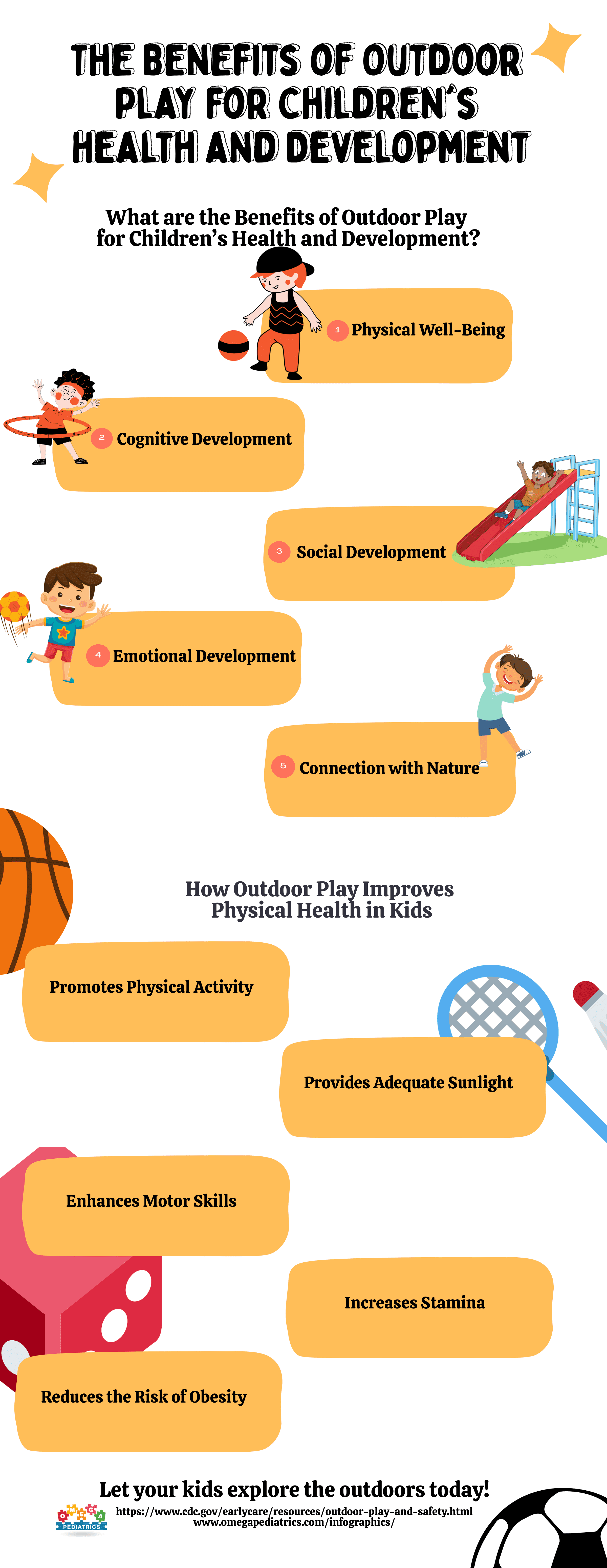
Outdoor play is not only enjoyable for children but also provides numerous benefits for their overall health and development. Engaging in outdoor activities allows children to explore, interact with their environment, and develop important skills. Here are the key benefits of outdoor play for children’s health and development:
- Physical Well-Being
Outdoor play significantly contributes to children’s physical well-being. It promotes physical activity and helps children develop healthy habits that can last a lifetime. Regular physical activity supports healthy growth, improves cardiovascular health, and strengthens muscles and bones.
- Cognitive Development
Outdoor play stimulates cognitive development in children. The natural environment offers a wealth of sensory experiences, such as the sights, sounds, and textures of nature. These experiences enhance cognitive abilities such as problem-solving, critical thinking, creativity, and imagination. Outdoor play also provides opportunities for children to explore cause-and-effect relationships, develop spatial awareness, and engage in open-ended play.
- Social Development
Outdoor play fosters social interactions and the development of important social skills. When children engage in outdoor play, they have opportunities to interact with their peers, learn how to share, take turns, negotiate, and resolve conflicts. Collaborative play in outdoor settings encourages teamwork, communication, and cooperation.
- Emotional Development
Outdoor play promotes emotional well-being and resilience in children. Spending time in nature has a calming effect, reducing stress and anxiety. It allows children to engage in unstructured play, which encourages creativity and self-expression. Outdoor environments also provide opportunities for risk-taking, which helps children develop self-confidence, problem-solving skills, and the ability to assess and manage risks.
- Connection to Nature
Outdoor play connects children to the natural world, fostering a sense of appreciation and respect for the environment. Spending time in nature enhances children’s understanding of the world around them, promotes curiosity about plants and animals, and cultivates a sense of environmental stewardship. This connection to nature has positive implications for children’s mental health, well-being, and environmental awareness.
How Outdoor Play Improves Physical Health in Kids:
- Promotes Physical Activity
Outdoor play encourages children to engage in active play, such as running, jumping, climbing, and playing games. This increases their overall physical activity levels, which is essential for maintaining a healthy weight, strengthening muscles and bones, and improving cardiovascular fitness.
- Provides Adequate Sunlight
Outdoor play exposes children to natural sunlight, which is a primary source of vitamin D. Vitamin D is essential for the absorption of calcium and the development of strong bones. Sunlight exposure also supports mood regulation and helps maintain a healthy sleep-wake cycle.
- Enhances Motor Skills
Outdoor play provides opportunities for children to engage in various physical activities that enhance their motor skills. Activities like climbing on playground equipment, riding bikes, or playing sports help develop coordination, balance, agility, and fine motor skills.
- Increases Stamina
Engaging in outdoor play and physical activities challenges children’s endurance and increases their stamina over time. Regular outdoor play helps improve cardiovascular fitness, leading to increased stamina and energy levels.
- Reduces the Risk of Obesity
Outdoor play promotes a healthy lifestyle and reduces the risk of childhood obesity. Outdoor activities encourage children to be physically active and burn calories, contributing to weight management and reducing the likelihood of obesity-related health issues.
Encouraging children to engage in outdoor play is vital for their overall health, well-being, and development. Parents, caregivers, and educators play a crucial role in creating opportunities for outdoor play, whether in parks, natural settings, or safe outdoor play areas. By embracing outdoor play, we provide children with valuable experiences that nurture their physical health, cognitive abilities, social skills, emotional well-being, and connection to the natural world.
The Importance of Outdoor Play in Early Childhood Education
As we delve deeper into the myriad benefits of outdoor play for children’s health and development, it becomes evident that this simple yet profound activity plays a pivotal role in shaping various aspects of a child’s growth. From fostering physical well-being to enhancing cognitive and emotional development, outdoor play stands as a cornerstone in early childhood education.
1. Multifaceted Cognitive Growth
Beyond the immediate physical benefits, outdoor play acts as a catalyst for multifaceted cognitive development. Nature provides an ever-changing canvas of sensory stimuli, igniting a child’s imagination and creativity. The diverse textures, colors, and sounds in an outdoor environment stimulate a child’s senses, laying the foundation for enhanced problem-solving skills, critical thinking, and a broader scope of imagination.
2. Outdoor Play and Academic Performance
Research consistently highlights the positive correlation between outdoor play and academic performance. Exposure to nature has been linked to improved concentration and focus, translating into better classroom performance. The skills acquired through outdoor play, such as spatial awareness and cause-and-effect understanding, serve as a solid foundation for academic success.
3. Beyond Boundaries: Exploring Risk and Resilience
Outdoor play introduces an element of controlled risk-taking, a crucial component in the development of resilience and self-confidence. Whether climbing a tree, navigating uneven terrain, or simply exploring, children learn to assess and manage risks. This exposure contributes to the development of a resilient mindset, preparing them for the challenges they may encounter in various aspects of life.
4. Outdoor Play as a Social Catalyst
The social aspect of outdoor play cannot be overstated. Beyond the confines of structured settings, children learn the art of cooperation, negotiation, and conflict resolution. Unstructured outdoor play allows for spontaneous interactions, fostering the development of teamwork and effective communication – skills that are indispensable in both personal and professional spheres later in life.
5. Nature as a Classroom
The natural world serves as a dynamic classroom, offering lessons that textbooks cannot replicate. Exposure to the outdoors cultivates a sense of environmental awareness and responsibility. Children develop a profound connection to nature, fostering a lifelong appreciation for the environment and instilling values of conservation and sustainability.
How Parents and Educators Can Facilitate Outdoor Play
1. Creating Outdoor Play Environments
Parents and educators can play a pivotal role in creating conducive outdoor play environments. Designing safe and stimulating outdoor spaces, whether in schoolyards, community parks, or home gardens, provides children with the opportunity to explore, discover, and engage in unstructured play.
2. Balancing Structured and Unstructured Play
While structured activities have their merits, finding a balance with unstructured play is crucial. Allowing children the freedom to choose their activities fosters independence and self-directed learning. Nature’s unpredictability nurtures adaptability and creativity in problem-solving.
3. Incorporating Nature in Learning
Integrating outdoor elements into the learning curriculum enhances the educational experience. Lessons conducted in natural settings, such as identifying plant species or studying ecosystems, not only reinforce academic concepts but also deepen the connection between children and the natural world.
4. Fostering a Culture of Outdoor Play
Parents and educators can collaborate to create a culture that values and prioritizes outdoor play. Organizing outdoor events, nature walks, and collaborative projects can further enrich a child’s overall educational experience.
Conclusion: Nurturing Future Generations Through Outdoor Play
In the evolving landscape of early childhood education, the significance of outdoor play emerges as a cornerstone for holistic development. As we navigate the multifaceted benefits of allowing children to immerse themselves in the natural world, a compelling narrative unfolds—one that underscores the vital role of outdoor play in shaping resilient, creative, and socially adept individuals.
From the physical vigor gained through activities like climbing and running to the cognitive prowess fostered by unstructured exploration, outdoor play offers a diverse array of stimuli essential for a child’s growth. As educators and parents, we stand as stewards of this crucial aspect of childhood, responsible for cultivating environments that allow these benefits to flourish.
The positive impact extends beyond the immediate advantages, influencing academic achievement, social acumen, and environmental stewardship. By embracing outdoor play, we are not merely providing children with an opportunity for recreation; we are sculpting the architects of our future society—individuals equipped with the skills, resilience, and environmental consciousness necessary to navigate an ever-changing world.
In the journey of childhood, the role of outdoor play is not confined to a mere recreational activity. It becomes a dynamic force shaping the very foundation of a child’s character. As we witness the joyous laughter echoing in parks, the collaborative spirit blossoming during outdoor adventures, and the quiet contemplation inspired by nature’s wonders, we recognize that the benefits of outdoor play transcend the immediate, leaving an indelible mark on a child’s journey toward adulthood.
In the collaborative efforts of parents, educators, and communities, we find the potential to create a generation that not only values the importance of physical health but also cherishes the nuances of intellectual curiosity, emotional resilience, and a deep connection to the natural world. Through the lens of outdoor play, we glimpse the promise of a brighter, more harmonious future—one where the lessons learned amidst the rustle of leaves and the warmth of sunlight echo in the choices our children make as they navigate the complexities of life.
In this symphony of growth, let outdoor play resonate as a melody that accompanies children on their journey towards becoming well-rounded, compassionate, and environmentally conscious individuals. For in the tapestry of childhood, the threads of outdoor play weave a narrative that extends far beyond the boundaries of the playground—it shapes the very fabric of our collective future.



